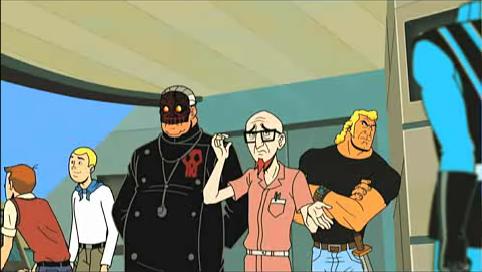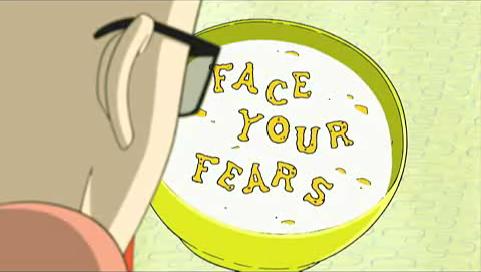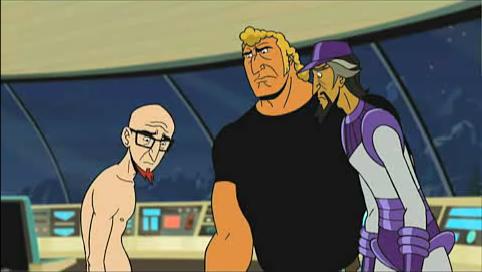The Venture Bros.: The Doctor is Sin
The Venture Bros. season three, week two. After last week's Monarch-exclusive episode, it's up to The Doctor is Sin to get us reacquainted with the Ventures themselves.
That much we could have guessed. But could anyone possibly have guessed that we'd also be reacquainted with...Dr. Henry Killinger?
 |
Well, yes. Yes they could.
Adult Swim kind of spoiled the surprise by broadcasting the first half of this episode on April Fool's Day, albeit in a rough, unfinished form. They didn't advertise it in advance...nobody knew it was coming, not even the creators of the show itself. (Jackson Publick, in his online journal, described the network's move as a sucker-punch.) Comparatively few Venture fans got to see it, but thanks to the wonders of the internet, the details circulated. We all knew Killinger would be back. The question was...did we want him back?
Now don't get me wrong. I loved Killinger's debut in I Know Why the Caged Bird Kills. Hell, it's my fourth-favorite episode. But I was more than a little apprehensive about his return. After all, his story last season was so...well, so perfect. So absolutely gorgeously handled. He was a brilliant diversion from the manic-yet-shoddy leadership we were all used to in The Monarch's cocoon. When Killinger showed up, things became more subdued. More serious. Things became...well, they became damn creepy, because we, as an audience, weren't really sure where Killinger stood. Was he going to be more dangerous to The Monarch's enemies, or to The Monarch himself?
That episode was an exercise in accelerating tension...why should we want to see Killinger again? All he can do is cheapen his original appearance...especially since, by the end of that episode, we do know where he stands: his prime concern was bringing The Monarch and Dr. Girlfriend back together. He was a hero after all. An incoherent, doughy hero.
So what of his return?
Jackson Publick, you've gone and made a fool out of me, because I loved it.
If there's any kind of fault with this return of Killinger's, it's that it doesn't actually happen until midway through the episode. And the first half is kind of...not nearly as good. Which pains me to say, because it isn't bad by any stretch of the imagination. But compared to last week's episode and this week's second act...the beginning of The Doctor is Sin is just a bit slow on the draw.
 |
Granted, we are being "reintroduced" to the Venture family here, so we get plenty of reminders of who they are and the state their affairs are in. And, honestly, bringing General Manhowers in for a tour of the facility (and a possible government contract) should have led to a great set-piece to open the show. Instead, though, it's just not funny enough. There are excellent moments (read on) and it's an absolute delight to hear James Urbaniak performing new Dr. Venture material (that man and that performance can elevate any sentence to a laugh riot), but there's not much to the opening other than silly costumes and a very sitcommy "Let's pretend we're successful!" routine. Oh, and a waaaaaaaay overlong reminder of the updated Jonny Quest. That should have been about a quarter of the length.
The funniest moment has got to be the arrival of Dr. Venture's potential new arch-nemesis...a strange, unexplained man in a sort of four-armed-condor costume whom Brock immediately beats to a pulp and drags behind the villain's own four-armed-condor-mobile. Lovely stuff. But other than that we really don't have much going on until Killinger arrives.
Maybe that's part of why I appreciated his return more than I had thought I would; he saved us from what was shaping up to be a pretty lackluster episode.
Once he's in action, though, Killinger does not let up. The episode shifts into high gear as he takes control of Venture Industries and installs himself as a sort of life-coach for Dr. Venture...forcing him to face his feelings of inadequacy, his fears of success, his unresolved issues with his father...and, at the climax of the episode, his antagonism toward his brother.
All of a sudden themes emerge, and characters struggle with themselves and their natures, and the show becomes The Venture Bros. again. And what a relief that is, because it gives us a very powerful second half, chock full of excellent little moments.
For starters, there's the relationship Killinger cultivates with the boys (who call him Uncle Henry), Dr. Orpheus' gory physical reaction to his realization of who Killinger is beneath the mask, and a surprising kinship between Triana and The Alchemist. The Alchemist, by the way, is more of an actual "character" in this episode than he ever was in season two. For this I am already hugely grateful.
 |
If you're going to try to dissect this episode, definitely take Manhowers' advice and grab your Bible, because there are overt references to the serpent and the apple, to Cain and Abel, to David and Goliath, and possibly more that I haven't noticed yet. And, certainly, Killinger's attempt at rebirthing Dr. Venture has more than a little of the religious about it, casting Killinger in even more confusing shadows.
One thing that leaves me just slightly confounded is the ending...but I mean that in a very good way. Dr. Killinger attempts to get Dr. Venture to treat his more successful brother as his new arch-enemy...and to destroy him on the spot. After what is certainly a strong internal struggle, Dr. Venture declines and Killinger departs, leaving Venture alone again, stripped of his uniform and newfound success. All of which suggests, on the surface, that Venture has failed in Killinger's eyes.
Yet, rewatching the episode, I'm left to reconsider that stance. Couldn't it be that the opportunity to destroy his brother was merely Venture's final test, and that by ultimately declining he actually passed? After all, Killinger entered The Monarch's life under the promise of destroying Venture...but that turned out to be an important lie so that he could accomplish his real goal of reuniting him with Dr. Girlfriend.
Likewise, couldn't this ostensible offer of fratricide have been merely a peg upon which he could hang Venture's potential development as a human being? It's possible. Killinger departs not because he's disappointed, but because Venture has become able to accept this aspect of his life, the one that was causing him so much grief, and is no longer in need of his life-coach.
Dr. Venture displays genuine concern at the end of the episode that he is, deep down inside, a bad person; a suggestion Killinger must have used to get him to destroy his brother. But you know what? The very fact that he questions himself is the first indication we've ever had that he might not be an entirely bad person.
And you know what else? The second half of this episode is everything The Venture Bros. should be. Here's to the rest of the season being all second halves.

Second Opinion
Sunday night was not the first time that the newest Venture Brothers episode, “The Doctor is Sin,” graced the warm sterile glow of viewers’ televisions, it was just the first time anyone was actually aware that it was on. In past years, Adult Swim has celebrated April Fool’s Day as a major holiday, and this year was no exception – though scheduled to (yet again) show the Aqua Teen Hunger Force movie, viewers instead got sneak peeks at the latest episode of Metalocalypse, as well as the first half of “The Doctor is Sin,” minus some of the final touches like music and sound effects. Even Doc and Jackson hadn’t known that it would be aired, but Jackson expressed in his blog that ultimately they didn’t mind that it had been.
Those of us who didn’t happen to be watching television that evening (myself included) would just have to hope that it might find its way to YouTube, or to finish up the last stretch of the wait between seasons. Personally, I chose to wait, and to view the full episode in all of its intended glory. And glorious it was. “The Doctor is Sin” definitely made a place onto my list of favorite Venture Brothers episodes. Because this list is non-existent, I can’t exactly say where it placed, but I can tell you that I really loved this episode.
The episode began with some typical Venture shenanigans – General Manhowers is coming to the compound for a tour and possibly to discuss some manner of contract, and Dr. Venture has apparently concocted an elaborate scheme to make his facility appear bustling and successful. This then requires the residents of the compound to take part in a very sitcom-ish performance, complete with crazy costumes (I have begun to think that Doc and Jackson purposefully see how often they can put their characters into bizarre outfits). I would not have found this situation particularly funny in most other shows, but the way that the characters were required to act in order to make a good impression on Manhowers was just so contrary to their natures. Dr. Venture attempting to come off as anything like the successful scientist his father was is an infinitely amusing exercise in failure, and failure is of course what The Venture Brothers is all about.
I was able to strike the first thing off of my list of predictions for season three when Dr. Henry Killinger made a reappearance, and immediately began doing the two things he proved himself to be best at in season two’s “I Know Why the Caged Bird Kills” – fixing things and being creepy. Though he has his work cut out for him when it comes to Dr. Venture’s life, Killinger is able to completely turn things around at the Venture Compound, albeit through mysterious means. One of the episode’s best moments occurs just after he has introduced Dr. Venture to his new “Venchmen” – smoke is seen coming from the manufacturing wing, which Brock and the boys immediately attribute to a fire, possibly caused by another attack by a young super villain hoping to follow in the Monarch’s pointy-toed footsteps. Killinger informs them that it is not a fire, but “industry, breathing new life into the corpse of the Venture Compound.” There is a pan shot which shows Dr. Venture covering his mouth in amazement, tears welling up in his eyes. It is one of the few moments where we see the person Venture is underneath all of his sarcasm and cynicism, though not actually the last in this episode.
Yet while Dr. Venture may be happy with what Killinger has done for the compound, it quickly becomes clear that there may be more to the umbrella-toting doctor than meets the eye. Maybe we should have expected it from someone who carries a “Magic Murder Bag,” but it still came as a bit of a shock to me when said bag was opened and killed three businessmen in a flash of light. Orpheus immediately knows that something is up, but when he confronts Killinger he proves to be no match for whatever weird magic lies behind that small and rather amusing mask. This does pave the way for the return of at least a third of the Order of the Triad when Triana calls The Alchemist for help with her catatonic father, and he is incredibly funny as usual. I have a feeling we’re going to get at least a few more episodes this season centering around the Order, and I am definitely looking forward to them.
Also in the awesome side character appearance department is a brief scene with everyone’s favorite albino/hydrocephalic midget duo, Conjectural Technologies, who learn that they are being bought out by Venture Industries. There had actually been a time when I had feared that Pete and Billy would not be returning in season three – Doc and Jackson have stated in commentary that they were discouraged from using them, and they received much less screen time in season two. In some rather bizarre breakage of the fourth wall in the tour of Astrobase Go on the season two DVD, Pete commented that he thought they would be written out of the show along with Baron Underbheit, a villainous figure who never really lived up to his potential. I’ll admit that I’m partial to Pete and Billy, because along with Dr. Venture they’re my favorite characters, but I also think they’re an essential element to the show, providing a somewhat different view of the Venture family not just from the standpoint of an outside force, but of fans. Pete and Billy were from the generation of little boys who grew up watching the heroics of Jonas Venture, and idolizing the boy who would someday become Dr. Thaddeus Venture.
We finally get more exploration of the relationship between Dr. Venture and his father, and why he wasn’t able to make it to adulthood without becoming incredibly warped. In a bizarre journey through Rusty’s self-conscious, set into motion by the Magic Murder Bag, light is shed upon why Dr. Venture has grown to see his father as a figure to be feared and hated instead of loved. It’s a jumble of both Biblical and Oedipal themes with gumdrops on top (literally!), and it was fantastic. I can’t help but think that Dr. Venture’s at least partial confrontation of some of his problems in this episode may later serve to bring about some change in his character, or the way in which he deals with others. Certainly, it would take quite a period of time for him to achieve any state that might be called “normal” by any stretch of the imagination, but the first step for any change is confrontation of the issue.
It is revealed near the end that Killinger has been attempting to mold Dr. Venture into a super villain, which he claims is what Venture was ultimately meant to do, and what he must do in order to break the control that his father and brother have over his life. Brock, Orpheus, and The Alchemist race against the clock to stop Rusty before he signs a dubious contract in blood, but arrive to find that he has instead signed Killinger’s severance agreement, and Killinger himself “just flew out the window” (along with Dr. Venture’s nifty new costume). This is both the saddest moment in the episode, and the one that leaves me the most optimistic for Dr. Venture to possibly learn to cope with things in the future. He seems utterly dumbfounded by the fact that Killinger thought he was meant to be a supervillain, and with just cause. Issues of good and evil have never seemed to plague Dr. Venture – his father was a “good guy,” and that’s what he is as well. The Guild of Calamitous Intent makes it easy to identify who the “bad guys” are, at least in theory. One of the greatest things about this show, however, is the fact that The Monarch is often a more likeable character than the man generally defined as the protagonist. The simple fact that he was the son of Jonas Venture automatically meant a lot of things for Rusty, and perhaps he will come to realize that it is not his father or family name that controls his destiny, but himself…or possibly an odd little man with skull slippers, as we are still not really told who Killinger is, what powers he possesses, or what his motives are.
![]()
About this entry
- By Phil Reed
- Posted on Saturday, June 07 2008 @ 2:40 am
- Categorised in TV, Review
- Tagged with the venture bros
- 0 comments
